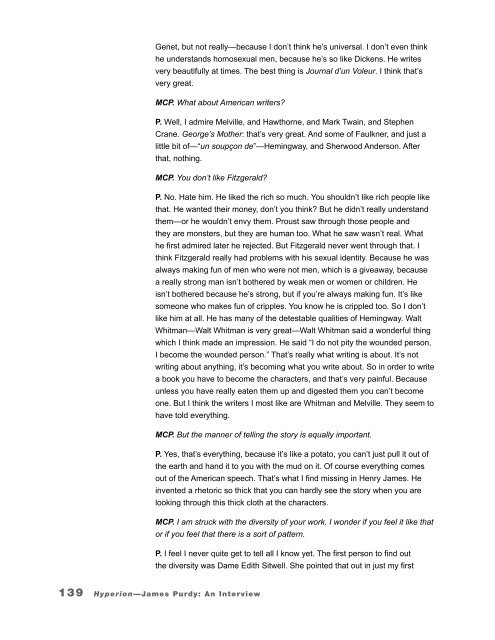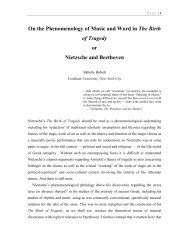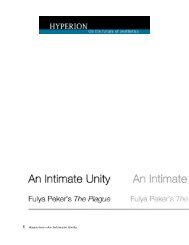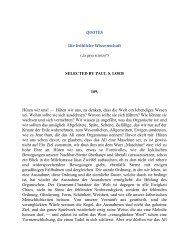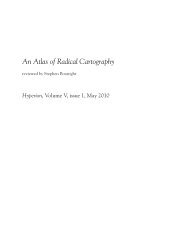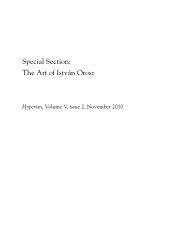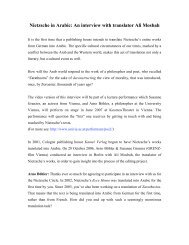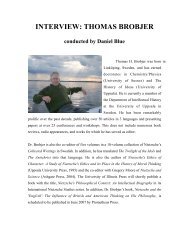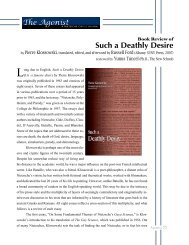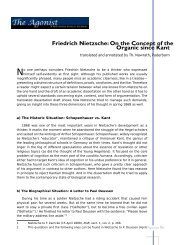Hyperion - Nietzsche Circle
Hyperion - Nietzsche Circle
Hyperion - Nietzsche Circle
You also want an ePaper? Increase the reach of your titles
YUMPU automatically turns print PDFs into web optimized ePapers that Google loves.
Genet, but not really—because I don’t think he’s universal. I don’t even think<br />
he understands homosexual men, because he’s so like Dickens. He writes<br />
very beautifully at times. The best thing is Journal d’un Voleur. I think that’s<br />
very great.<br />
MCP. What about American writers?<br />
P. Well, I admire Melville, and Hawthorne, and Mark Twain, and Stephen<br />
Crane. George’s Mother: that’s very great. And some of Faulkner, and just a<br />
little bit of—“un soupçon de”—Hemingway, and Sherwood Anderson. After<br />
that, nothing.<br />
MCP. You don’t like Fitzgerald?<br />
P. No. Hate him. He liked the rich so much. You shouldn’t like rich people like<br />
that. He wanted their money, don’t you think? But he didn’t really understand<br />
them—or he wouldn’t envy them. Proust saw through those people and<br />
they are monsters, but they are human too. What he saw wasn’t real. What<br />
he first admired later he rejected. But Fitzgerald never went through that. I<br />
think Fitzgerald really had problems with his sexual identity. Because he was<br />
always making fun of men who were not men, which is a giveaway, because<br />
a really strong man isn’t bothered by weak men or women or children. He<br />
isn’t bothered because he’s strong, but if you’re always making fun. It’s like<br />
someone who makes fun of cripples. You know he is crippled too. So I don’t<br />
like him at all. He has many of the detestable qualities of Hemingway. Walt<br />
Whitman—Walt Whitman is very great—Walt Whitman said a wonderful thing<br />
which I think made an impression. He said “I do not pity the wounded person,<br />
I become the wounded person.” That’s really what writing is about. It’s not<br />
writing about anything, it’s becoming what you write about. So in order to write<br />
a book you have to become the characters, and that’s very painful. Because<br />
unless you have really eaten them up and digested them you can’t become<br />
one. But I think the writers I most like are Whitman and Melville. They seem to<br />
have told everything.<br />
MCP. But the manner of telling the story is equally important.<br />
P. Yes, that’s everything, because it’s like a potato, you can’t just pull it out of<br />
the earth and hand it to you with the mud on it. Of course everything comes<br />
out of the American speech. That’s what I find missing in Henry James. He<br />
invented a rhetoric so thick that you can hardly see the story when you are<br />
looking through this thick cloth at the characters.<br />
MCP. I am struck with the diversity of your work. I wonder if you feel it like that<br />
or if you feel that there is a sort of pattern.<br />
P. I feel I never quite get to tell all I know yet. The first person to find out<br />
the diversity was Dame Edith Sitwell. She pointed that out in just my first<br />
139 <strong>Hyperion</strong>—James Purdy: An Interview


